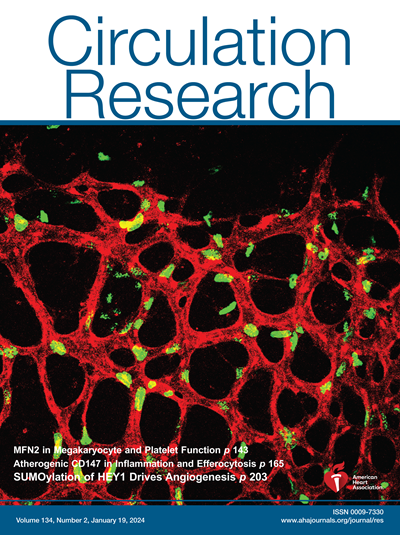Salt Responsive Gut Microbiota Induces Sex Specific Blood Pressure Changes.
IF 16.5
1区 医学
Q1 CARDIAC & CARDIOVASCULAR SYSTEMS
引用次数: 0
Abstract
BACKGROUND Tryptophan metabolism is important in blood pressure regulation. The tryptophan-indole pathway is exclusively mediated by the gut microbiota. ACE2 (angiotensin-converting enzyme 2) participates in tryptophan absorption, and a lack of ACE2 leads to changes in the gut microbiota. The gut microbiota has been recognized as a regulator of blood pressure. Furthermore, there is ample evidence for sex differences in the gut microbiota. However, it is unclear whether such sex differences impact blood pressure differentially through the tryptophan-indole pathway. METHODS To study the sex-specific mechanisms of gut microbiota-mediated tryptophan-indole pathway in hypertension, we generated a novel rat model with Clustered Regularly Interspaced Short Palindromic Repeats/Cas9 (Clustered Regularly Interspaced Short Palindromic Repeats-associated protein 9)-targeted deletion of Ace2 in the Dahl salt-sensitive rat. Cecal microbiota transfers from donors of both sexes to female S recipients were performed. Also, Dahl salt-sensitive rats of both sexes were orally gavaged with indole to investigate blood pressure response. RESULTS The female gut microbiota and its tryptophan-indole pathway exhibited greater buffering capacity when exposed to tryptophan, due to Ace2 deficiency, and salt. In contrast, the male gut microbiota and its tryptophan-indole pathway were more vulnerable. Female rats with male cecal microbiota responded to salt with a higher blood pressure increase. Indole, a tryptophan-derived metabolite produced by gut bacteria, increased blood pressure in male but not in female rats. Moreover, salt altered host-mediated tryptophan metabolism, characterized by reduced serum serotonin of both sexes and higher levels of kynurenine derivatives in the females. CONCLUSIONS We uncovered a novel sex-specific mechanism in the gut microbiota-mediated tryptophan-indole pathway in blood pressure regulation. Salt tipped the tryptophan metabolism between the host and gut microbiota in a sex-dependent manner. Our study provides evidence for a novel concept that gut microbiota and its metabolism play sex-specific roles in the development of salt-sensitive hypertension.盐反应性肠道微生物群诱导不同性别的血压变化
背景色氨酸代谢对血压调节非常重要。色氨酸-吲哚途径完全由肠道微生物群介导。ACE2(血管紧张素转换酶 2)参与色氨酸的吸收,缺乏 ACE2 会导致肠道微生物群发生变化。肠道微生物群被认为是血压的调节器。此外,有大量证据表明肠道微生物群存在性别差异。方法为了研究肠道微生物群介导的色氨酸-吲哚通路在高血压中的性别特异性机制,我们在对盐敏感的达尔大鼠中建立了一种新型大鼠模型,该模型通过靶向缺失 Ace2 产生了簇状正则间隔短联合重复序列/Cas9(簇状正则间隔短联合重复序列相关蛋白 9)。进行了从雌雄供体到雌性 S 受体的盲肠微生物群转移。结果雌性肠道微生物群及其色氨酸-吲哚途径在暴露于色氨酸(由于缺乏 Ace2)和盐时表现出更强的缓冲能力。相比之下,雄性肠道微生物群及其色氨酸-吲哚途径更容易受到影响。带有雄性盲肠微生物群的雌性大鼠对盐的反应是血压升高。吲哚是一种由肠道细菌产生的色氨酸代谢产物,它能增加雄性大鼠的血压,但不能增加雌性大鼠的血压。此外,盐还改变了宿主介导的色氨酸代谢,其特点是雌雄大鼠的血清 5-羟色胺均降低,而雌性大鼠的犬尿氨酸衍生物水平更高。盐以性别依赖的方式使色氨酸代谢在宿主和肠道微生物群之间发生倾斜。我们的研究为一个新概念提供了证据,即肠道微生物群及其代谢在盐敏感性高血压的发病中发挥着性别特异性作用。
本文章由计算机程序翻译,如有差异,请以英文原文为准。
求助全文
约1分钟内获得全文
求助全文
来源期刊

Circulation research
医学-外周血管病
CiteScore
29.60
自引率
2.00%
发文量
535
审稿时长
3-6 weeks
期刊介绍:
Circulation Research is a peer-reviewed journal that serves as a forum for the highest quality research in basic cardiovascular biology. The journal publishes studies that utilize state-of-the-art approaches to investigate mechanisms of human disease, as well as translational and clinical research that provide fundamental insights into the basis of disease and the mechanism of therapies.
Circulation Research has a broad audience that includes clinical and academic cardiologists, basic cardiovascular scientists, physiologists, cellular and molecular biologists, and cardiovascular pharmacologists. The journal aims to advance the understanding of cardiovascular biology and disease by disseminating cutting-edge research to these diverse communities.
In terms of indexing, Circulation Research is included in several prominent scientific databases, including BIOSIS, CAB Abstracts, Chemical Abstracts, Current Contents, EMBASE, and MEDLINE. This ensures that the journal's articles are easily discoverable and accessible to researchers in the field.
Overall, Circulation Research is a reputable publication that attracts high-quality research and provides a platform for the dissemination of important findings in basic cardiovascular biology and its translational and clinical applications.
 求助内容:
求助内容: 应助结果提醒方式:
应助结果提醒方式:


